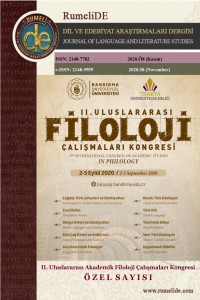Abstract
Safahat, Türk edebiyatının en çok okunan kitaplarındandır. Ona gösterilen ilginin çeşitli nedenleri vardır. Kitabın İstiklâl Marşı’nı kaleme alan Mehmet Âkif’e ait olması, Âkif’in son dönem Türk edebiyatının önemli isimlerinden biri olması, Safahat’ın muhteva yoğunluğu, Türk toplumunun sorunlarına eğilmesi ve bir asır boyunca güncelliğini kaybetmemesi söz konusu sebeplerden bazılarıdır. Eserin genel itibariyle sade, anlaşılır bir dil ile yazılması da bu sebeplere eklenebilir. Halk dilinden uzak olmayan yazım tarzı, Âkif’in kendine has üslubu akıcı ve akılda yer eden bir eserin ortaya çıkmasını sağlamıştır. Safahat’ın çok okunmasını, akıcılığını ve akılda kalıcılığını sağlayan veciz ifadeler ise dikkat çekicidir. Önemli bir meseleyi, belli bir prensibi, şairin perspektifini özetleyen veciz mısralar, Safahat’ın en çok ilgi çeken özelliklerinden biri olagelmiştir. Bu çalışmada, Safahat’ta geçen bazı veciz ifadelere odaklanılacaktır. Böylece Safahat’ın söyleyiş boyutuna bir kez daha farklı bir ışık tutulması amaçlanmıştır. Safahat’ta, anlamındaki yoğunluğun söyleyiş güzelliğiyle buluştuğu ve adeta birer formülü andıran özlü ifadelerin sayısı oldukça fazladır. Bunların hepsini ele almak ise kısıtlı bir çalışmanın kapsamını aşar. O yüzden, belli konu başlıkları altında seçmeye tabii tutarak kitapta geçen veciz ifadelerin anlam boyutu ele alınacak ve bugüne hangi mesajları sunduğu üstünde durulacaktır. Çalışma, eserde geçen veciz ifadelerin, anlatılan konu hakkında okuyucuyu düşündürdüğü, kitlelerin esere tekrar dönmesini sağladığı ve işlenen konunun “Âkifçe” ifadesini verdiği sonuçlarına varır.
Keywords
References
- Devellioğlu,F. (1978). Osmanlıca – Türkçe Ansiklopedik Lûgat. Ankara: Doğuş.
- Ersoy, M. Â. (2003). Safahat. İstanbul: İnkılâp...................
- Ersoy, M. Â. (2016). Tefsir Yazıları ve Vaazlar. Ankara: DİB.
- Horoz, Y. (2010). Mehmet Âkif Ersoy’un Safahat’ta Anlam ve Telmih Olarak Kullandığı Hadislerin İncelenmesi. İstanbul: Marmara Üniversitesi Sosyal Bilimler Enstitüsü Yayımlanmamış Yüksek Lisans Tezi.
- Karataş, T. (2011). Edebiyat Terimleri Sözlüğü. İstanbul: Sütun. ..............
- Kumsar, İ. A. (2010). Safahat’ta Özlü Sözler. Ankara: Gazi Üniversitesi Sosyal Bilimler Enstitüsü Yayımlanmamış Yüksek Lisans Tezi.
- Okay, O. (1998). Mehmed Âkif – Bir Karakter Heykelinin Anatomisi. Ankara: Akçağ.
- Tâhir-ül Mevlevî, (1994). Edebiyat Lügatı. İstanbul: Enderun..................
- Yetiş, K. (1992). Mehmet Âkif’in Sanat-Edebiyat ve Fikir Dünyasından Çizgiler, Ankara: AKM.
Abstract
Safahat is one of the most read books of Turkish literature. There are several reasons for the interest shown to him. Some of the reasons are that the book belongs to Mehmet Âkif, who wrote the National Anthem, that Âkif is one of the most important names in the recent Turkish literature, Safahat's content density, Turkish society has been addressing its problems and has not lost its currentness for a century. The writing of the work in a plain, comprehensible language in general can be added to these reasons. The style of writing, which is not far from the folk language, has led to the emergence of a fluent and memorable work of Âkif's unique style. The terse statements that provide the reading, fluency and catchyness of Safahat are remarkable. Sumptuous lines that summarize an important issue, a certain principle, the poet's perspective have been one of the most interesting features of Safahat. This study will focus on some terse statements in Safahat. Thus, it is aimed to shed a different light on Safahat's utterance dimension once again. In Safahat, the number of concise expressions in which the intensity in the meaning meets the beauty of speech and almost resembles a formula is quite high. Addressing all of these goes beyond the scope of a limited study. Therefore, the meaning dimension of the terse statements in the book will be discussed by selecting them under certain topics and will focus on what messages he has presented to today. The study concludes that aphorism expressions in the work make the reader think about the subject, make the masses return to the work and give the expression “in the manner of Âkif”.
Keywords
References
- Devellioğlu,F. (1978). Osmanlıca – Türkçe Ansiklopedik Lûgat. Ankara: Doğuş.
- Ersoy, M. Â. (2003). Safahat. İstanbul: İnkılâp...................
- Ersoy, M. Â. (2016). Tefsir Yazıları ve Vaazlar. Ankara: DİB.
- Horoz, Y. (2010). Mehmet Âkif Ersoy’un Safahat’ta Anlam ve Telmih Olarak Kullandığı Hadislerin İncelenmesi. İstanbul: Marmara Üniversitesi Sosyal Bilimler Enstitüsü Yayımlanmamış Yüksek Lisans Tezi.
- Karataş, T. (2011). Edebiyat Terimleri Sözlüğü. İstanbul: Sütun. ..............
- Kumsar, İ. A. (2010). Safahat’ta Özlü Sözler. Ankara: Gazi Üniversitesi Sosyal Bilimler Enstitüsü Yayımlanmamış Yüksek Lisans Tezi.
- Okay, O. (1998). Mehmed Âkif – Bir Karakter Heykelinin Anatomisi. Ankara: Akçağ.
- Tâhir-ül Mevlevî, (1994). Edebiyat Lügatı. İstanbul: Enderun..................
- Yetiş, K. (1992). Mehmet Âkif’in Sanat-Edebiyat ve Fikir Dünyasından Çizgiler, Ankara: AKM.
Details
| Primary Language | Turkish |
|---|---|
| Subjects | Linguistics |
| Journal Section | Turkish language, culture and literature |
| Authors | |
| Publication Date | November 21, 2020 |
| Published in Issue | Year 2020 Issue: Ö8 |

